|
| Adhesive Capsulitis/Frozen Shoulder AnatomyYour shoulder joint involves bones, muscles, tendons, ligaments, connective tissues and synovial fluid. There are 3 main bones in your shoulder: the shoulder blade (scapula), the collarbone (clavicle) and the upper arm bone (humerus). These are attached to each other by ligaments (attach bone to bone). Muscles move your bones by pulling on your tendons (attach muscle to bone). Both tendons and ligaments provide stability and alignment to your joint to ensure easy movement in your shoulder. The main muscles involved with your shoulder joint are your rotator cuff muscles (supraspinatus, subscapularis, infraspinatus and teres minor), as well as your biceps brachii (upper arm), deltoid (top of the shoulder), and trapezius (upper back) muscles. 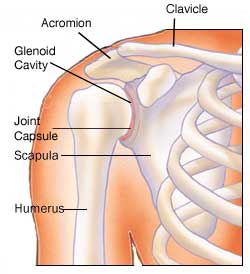 The shoulder is one of the most mobile and flexible joints in your body. It is a "ball and socket" joint (glenohumeral joint), in which the ball (the top, rounded part of your humerus) is held in the socket (the shallow, depressed area called your glenoid cavity, located on the outer edge of your scapula). There is a ring of fibrous cartilage (labrum) that surrounds the glenoid cavity and articular cartilage (slick, hard connective tissue) that covers the end of the humerus to help stabilize the ball in the socket and reduce friction. Your entire joint is surrounded by a tough, fibrous, flexible shoulder joint capsule and inner synovial membrane that produces synovial fluid (thick, egg-white like fluid). This helps to lubricate your shoulder joint and allows the bones to move easily within your joint. When your arm is raised over your head the joint capsule is fully stretched, when your arm is lowered to your side, the capsule rests in a small, pouch-like sac. Your bursa is a fluid-filled sac that lies beneath your acromion (bump on top, outer edge of your clavicle) and above your soft tissues to prevent rubbing when your bones are moved. 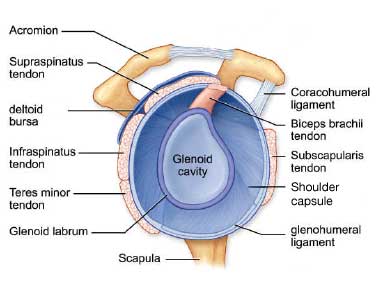 What is Adhesive Capsulitis?Your shoulder has an amazing range of motion which is a blessing and a curse, as it can sometimes lack stability which makes it more prone to injury. The conditions adhesive capsulitis and frozen shoulder are often used interchangeably; however there is a slight difference between the two conditions. Literally the word adhesive means "scarring", and capsulitis means "inflammation of the capsule". Adhesive capsulitis happens when the shoulder joint capsule and soft tissues surrounding your socket (glenoid cavity) become inflamed, swollen and contracted. This causes bands of scar tissue (adhesions) to develop in your joint; as a result your tissues become less flexible, stick together and restrict movement. You will experience pain, stiffness, a limited range and gradual loss of overall motion in your shoulder joint, because of the adherence of your shoulder capsule to the top of your humerus. Eventually your joint may become stuck to the point where you have no movement at all. 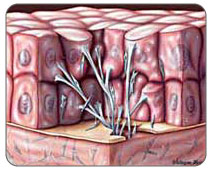 Frozen shoulder is the generalized name for gradual loss of ability to move your shoulder in all directions. A number of pre-existing conditions can cause and/or encourage adhesive capsulitis to occur in your shoulder joint. This condition is influenced by injuries to your shoulder muscles, tendons, ligaments and the associated bursa, as well as other diseases. Often before you can deal with or determine the other conditions, you must first get rid of the adhesive capsulitis and regain movement in your shoulder. Adhesive capsulitis affects 2 - 5% of the population (about 1 in 50 adults will get this at some time in their life). Generally you will experience adhesive capsulitis in either your left or right shoulder, whichever is your non-dominant shoulder (if you are right handed it would be in your left shoulder and vice versa). About 15% of the population (1 in 5 cases) will get it on both sides at some time in their life, however rarely ever at the same time. It is very uncommon to suffer from adhesive capsulitis in the same shoulder twice and normally it does not affect other joints in your body. Adhesive capsulitis is not known to lead to major damage and/or other more serious conditions; more so, it is generally a side effect of other conditions and/or a condition in and of itself. Since adhesive capsulitis and frozen shoulder are very similar and difficult to differentiate, they are treated in the same way. For our purpose, we will look at these injuries as one condition. Alternate names and/or related conditions: The Shoulder TShellz Wrap®A Shoulder TShellz Wrap® is, in our view, one of the most helpful tools for a shoulder injury. Using a process we call Circulatory Boost, tissues are safely and gently heated - increasing blood flow within the treated area. Your body's natural response to this increased temperature is to try to maintain a condition of homeostasis - a balanced environment or state of equilibrium throughout the body. To do this, your body responds with a rapid increase in blood flow to the area (this is known as vasodilation), increasing the supply of nutrients to injured tissue and flushing out toxins (including lactic acid, commonly found in trigger points) to promote healing. TShellz Wraps® provide effective, non-invasive, non-addictive pain relief with no side effects. If you are suffering through a shoulder injury, we strongly believe that we can help you, and we have thousands of happy clients to back this claim. You are welcome to try our products for a 60 day period.. If you are committed to following the treatments outlined in the product instructions we are very confident that our TShellz Wraps will aid you immensely. If you do not receive the benefits that countless of our other customers have experienced from our products, call us, mail the product back to us and we will provide you with a full product refund. Our online shop accepts Visa & Mastercard as well as a Paypal Payment option. Our customer service lines are open 5 days a week helping people understand their injuries and how to treat them. Simply call toll free 1-866-237-9608 to talk or place an order with one of our knowledgeable Product Advisers. They have the ability to answer questions and even put together a treatment plan for you. Product Advisors are available 9:00 am to 5:00 pm Eastern Standard Time Monday to Friday. Living with pain is never easy and we encourage you to call us with any questions you have related to your frozen shoulder. We will do our best to help. Learn More About Shoulder Injuries & TreatmentsI want to learn more about Frozen Shoulder Causes. I want to learn more about TShellz Wrap® Circulatory Boost I want to learn more about Ice & Heat: Which Is Better For Treatment? I want to learn more about Trigger Points. I want to learn more about Frozen Shoulder Manipulation. I want to learn more about Post Surgery Recovery? FREE SHIPPING ON ALL PRODUCTS CURRENTLY ENABLED |
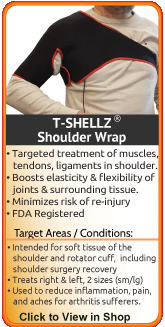 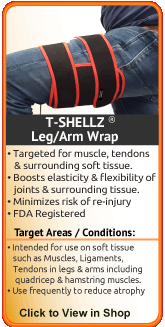  |